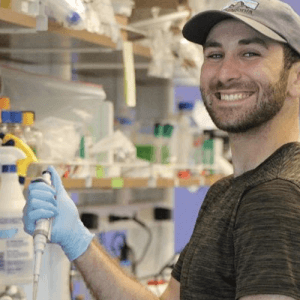Andrew Wagner
Dr. Andrew Wagner
Ph.D., University of Tennessee-Knoxville
Office: 504A Life Sciences Building
Phone: 1-419-372-2647
Email: andswag@bgsu.edu
Research Keywords: Fungal physiology and pathology, genetics, microbiology, zebrafish, burn wound infections, innate immunology

Student opportunities:
I am always looking for undergraduate and graduate students that are interested in research. Feel free to reach out if you are interested in my research and would like more information!
Research Interests:
The Wagner lab is broadly focused on better understanding host-fungal interaction dynamics in the context of human disease. Severe burn wound injuries (BWIs) are one example of a trauma induced injury that disrupts the integrity of the human skin. These injuries are susceptible to secondary fungal infections, where they delay wound healing and increase the risk of patient mortality. However, the mechanisms of fungal colonization of burn tissue and how the host subsequently responds to fungi within this niche remain unclear. Our work aims to elucidate the mechanisms utilized by fungi to successfully colonize, persist and invade burn tissue following thermal injury. To achieve this, we utilize a combination of fungal genetics, molecular biology techniques and microscopy in combination with a novel zebrafish burn wound infection model. These techniques allow us to identify fungal mechanisms of BWI infection, and to visualize how host immune cells interact with fungi in vivo throughout the infection process. Ultimately, the goal of the lab is to identify both host and fungal targets that dictate the fate of disease progression during BWI infections for downstream drug development.
Recent Publications:
Mercado Soto NM, Horn A, Keller NP, Huttenlocher A, Wagner AS. A conserved in vivo burn wound infection model for diverse pathogenic fungi. (In Revision, mBio) BioRxiv doi: 10.1101/2024.11.12.623264
Horn A, Wagner AS, Hou Y, et al. Isotonic medium treatment limits burn wound microbial colonization and improves tissue repair. Wound Rep Reg. 2025; 33(1):e13242. doi:10.1111/wrr.13242.
Wagner AS, Vogel AK, Lumsdaine SW, Phillips EK, Willems HME, Peters BM, et al. Mucosal Infection with Unmasked Candida albicans Cells Impacts Disease Progression in a Host Niche-Specific Manner. Infect Immun. 2022:e0034222. Epub 2022/11/15. doi: 10.1128/iai.00342-22.
Impact publications:
Wagner AS, Lumsdaine SW, Mangrum MM, Reynolds TB. 2023. Caspofungin-induced ß(1,3)-glucan exposure in Candida albicans is driven by increased chitin levels. mBio doi:10.1128/mbio.00074-23:e0007423.
Wagner AS, Lumsdaine SW, Mangrum MM, King AE, Hancock TJ, Sparer TE, et al. Cek1 regulates ß(1,3)-glucan exposure through calcineurin effectors in Candida albicans. PLoS Genet. 2022;18(9):e1010405. Epub 2022/09/20. doi: 10.1371/journal.pgen.1010405.
Wagner AS, Hancock TJ, Lumsdaine SW, Kauffman SJ, Mangrum MM, Phillips EK, Sparer TE, Reynolds TB. Activation of Cph1 causes ß(1,3)-glucan unmasking in Candida albicans and attenuates virulence in mice in a neutrophil-dependent manner. PLoS Pathog. 2021;17(8):e1009839. Epub 2021/08/26. doi: 10.1371/journal.ppat.1009839.
Updated: 01/07/2025 03:25PM
